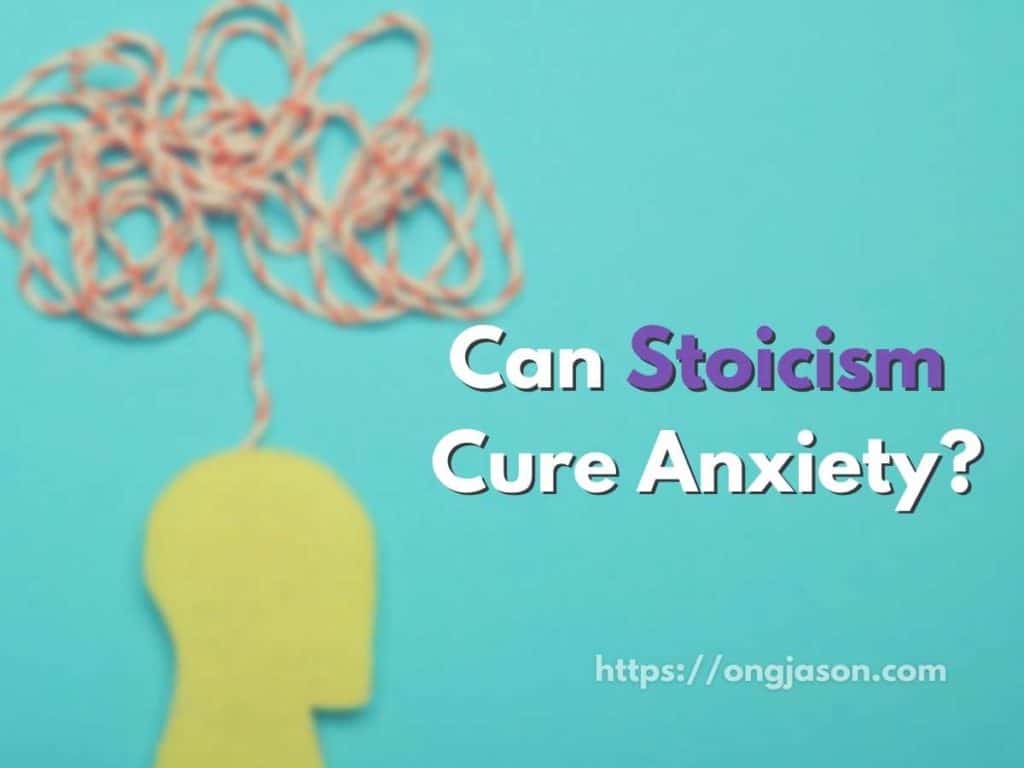Stoicism and Anxiety: Can Stoicism Deal with Anxiety?
My anxiety and I have been together for quite some time. My anxiety started when I graduated college, and I had no idea what to do with my life, typical for people in their quarter-life crisis. However, learning about Stoicism gave me some strength to reduce my anxiety. Right now, I experience stress once in a while but not on the anxiety level. So does Stoicism deal with anxiety? Let’s find out.
Does Stoicism Reduce Anxiety? Stoicism can help reduce anxiety, but since it is only a philosophy, it should not be considered as a replacement for actual therapy. Although modern cognitive behavior therapy was inspired by Stoic practice, it doesn’t replace a professional’s help.
Don’t get me wrong. Stoicism has helped me a lot in dealing with stress and anxiety. I know how helpful Stoicism is for my well-being. Thus, I will show how Stoicism can help us deal with and cure anxiety in this blog post.

Can Stoicism Cure Anxiety?
The practice of Stoicism can help cure anxiety and panic attacks. It helps us focus on the things we can control and helps us feel empowered. Because of this, we can experience less stress and anxiety. However, practicing Stoicism should not replace professional help and actual therapy.
While Stoicism should not be a replacement for an expert’s help, I know how helpful Stoics principles are when it comes to anxiety.
The helpfulness of Stoicism with regards to anxiety comes from its core principle, which is called the dichotomy of control.
The principle of the dichotomy of control is that everything that happens in our lives can be divided into two, which are the things we can and can’t control.
Stoicism teaches us that focusing on what we can control is essential if we want to feel empowered again.
The problem with anxiety is that we tend to focus on the things we can’t control most of the time. So, for example, we could be worrying about what others say if we follow our dreams.
Since our brain wants to control everything, it becomes stressed when it finds out it can’t. If we can’t accept the fact that we can’t control everything that happens, anxiety can occur.
That’s where Stoicism comes into play. It helps us find and focus on the things we control.
One of the most common applications of the dichotomy of control to anxiety is trying to change the past.
If we think about it, the past is the past. The only thing we can do about our past mistakes is learn from them.
However, there might be instances where we want to change the past. The problem is that changing the past is not possible because it’s already done.
Thus, living in the present moment is crucial if we want to lessen our stress and anxiety.
Stoicism tells us that we can enjoy our current situation regardless of how imperfect life is. In short, we begin to learn how to accept and be grateful for whatever we have.
This is because the present moment is the only thing we control. So while we can’t change the past, we can change our current actions for the better.
However, please note that not everything in the present is in our control.
An example is expecting something from others. We should not rely on other people for our happiness.
For one, they have their problems. But the most important thing is we can’t control them.
This makes us dependent on them for our happiness which is not ideal if we want a stable source of joy and to constantly live anxiety-free.
It is also worth noting that the Stoic principle of the dichotomy of control inspired modern cognitive behavior therapy, which is what professionals are using because it is effective in a range of problems, including depression, anxiety disorders, marital problems, and eating disorders.
However, while Stoicism inspired modern cognitive behavior therapy, it is hard to replace professional guidance.
It is still a good idea to consult an expert if needed.
While Stoicism helped me reduce my stress levels and anxiety, I know Stoicism should only serve as an aid to my troubles.
I know Stoicism helps, and its principles help us live a satisfying life.
Aside from the dichotomy of control, there are more reasons why Stoicism helps in anxiety which we’ll talk about in the next section.
Why Stoicism helps in Anxiety?
Stoicism helps in anxiety because it helps us focus on what’s important, which are the things we can change. One of the main reasons for anxiety is our frustration in our inability to control the things we have no power over. Thus, Stoicism helps us refocus our attention on what we can control.
Stoicism helps us accept the things we can’t control. In short, it helps us accept fate or what they call “nature.”
We need to accept that we aren’t a superhero that can fix everything around us.
Stoicism helps us reconcile with this fact by accepting the dichotomy of control.
While we should focus on what we can control, we should not mind the things outside our control.
Furthermore, Stoicism helps us understand how minor our problems are.
The Stoics believe in the interconnectedness of the world. This means everyone is connected one way or the other.
What I want to imply here is that we aren’t the only one who has problems.
Everyone living in this world has problems on their own that they face.
By knowing this, we understand that our problems are a tiny portion of the problems this world is facing.
Considering that there are billions of people around the globe and each has its own set of problems, our problems are insignificant.
Furthermore, since everyone has problems, fixing all our problems is not an option. Remember that everything is not in our control.
What matters is how we react to these problems. We should answer if we are overreacting to these problems.
Since Stoicism focuses on our present actions, which we can control, we can feel empowered to take matters into our hands.
For example, we can try healthy habits such as eating correctly and exercising if we have poor health.
We can try building our skills if we don’t have a job.
We have power over these things, and we should focus on them. This is also why Stoicism is popular among self-development forums.
As for myself, aside from improving my knowledge and improving my health, I lessened my caffeine intake.
According to research from the Journal of Psychopharmacology, caffeine has been related to stress, anxiety, and depression among students. Caffeine can come from energy drinks, coffee, cola, and tea. [1]
For me, I took matters into my hands by drinking decaf. As a result, my sleep got better, and I felt less anxious.
Another study from Advances in Psychiatric Treatment found that excessive caffeine ingestion leads to symptoms that overlap with many psychiatric disorders. This is a problem since many Psychiatrists rarely inquire about caffeine intake when assessing patients.[2]
As you can see, trying to research and take matters into your hands is what Stoicism is about. Once you understand the responsibility of improving your life, you can begin to make it better.
Researching and getting to this blog post signifies you want to change.
So, as a bonus, here is a mini-guide on handling anxiety as a stoic.
To use Stoicism in anxiety, on everything that happens, ask if the problem is inside or outside your control. If it is within your control, then try to solve it. If it’s not, then accept them as a part of life.
By practicing Stoicism, we would be happy even if life would sometimes throw lemons. We will feel at peace with our current standing and strive to be better in the future.
Stoicism helps us refocus our attention on what’s important. For me, it is the reason why it makes me feel empowered to finally face and take my anxiety to my hands.
What’s next? I made a blog post talking about dealing with stress using Stoic principles. You can find the blog post here: Stoic ways to deal with stress.
Sources:
- Richards, Gareth, and Andrew Smith. “Caffeine Consumption and Self-Assessed Stress, Anxiety, and Depression in Secondary School Children.” Journal of Psychopharmacology, vol. 29, no. 12, 2015, pp. 1236–47. Crossref, doi:10.1177/0269881115612404.
- Winston, Anthony P., et al. “Neuropsychiatric Effects of Caffeine.” Advances in Psychiatric Treatment, vol. 11, no. 6, 2005, pp. 432–39. Crossref, doi:10.1192/apt.11.6.432.

“Only the things I love.“
ongjason.com is reader-supported. When you buy through links on the site, I earn an affiliate commission.
If you’re following me, you’ll know that I believe it is essential to have some tools, whether it’s for personal development or lifestyle in general.
So, here are the things I love.
YouTube
If you want to learn things for free, I recommend watching my YouTube Channel. Click the Button Below to go straight into my Channel. 🙂
Okay, let me first explain my Channel.
I believe that I really can’t explain everything too well on my blog. That’s why I created a YouTube Channel so I can easily explain a lot of things. Plus, I believe that Video Sharing is the future.
Recommended Books
The next thing is books. Books are, for me, one of the cheapest ways to get invaluable information. We can learn personal development, finance, career, relationships, and many more from books.
Here, I will be listing my favorite books in different categories.
- For Beginners – 7 Habits of Highly Effective People by Stephen Covey – Personal development has a lot of concepts and ideas to learn. Thus it can be really hard for beginners to know where to start. Thus, I recommend this book since all the basic concepts of personal development are here(except finance, check what I recommended for that)
- Productivity – The One Thing by Gary Keller – This book teaches us the power of focusing on one thing which is the ultimate source of productivity. The concepts taught are what I am using to constantly publish YouTube videos while maintaining this website.
- Busy? – Make Time by Jack Knapp – This book teaches us how to make time for the things we love. The concept is really simple but I think that makes it a book worth reading.
- Health – Lifespan by Dr.Sinclair – This Book teaches about the latest scientific research on lifespan. In his book, he has shared numerous things he is doing to slow down his aging process. This can be as easy as eating less which he recommends.
- Finance – The Richest Man in Babylon by George Clason – Perhaps one of the first books I’ve read about Finance, this book for me is the best if we are talking about learning basic finance such as basic saving and investing. The concepts are very simple but effective.
Audiobooks
Take this advice as a grain of salt.
I don’t recommend buying Audiobooks one by one. I mean, audiobooks can be quickly finished by listening while working out or doing some mindless tasks.
So here is to save you some money. Just go for a monthly subscription to Audible. I believe that you will save a lot of money with that plus, they usually give freebies to anyone starting.
My Audiobook Recommendation will always be the same as my book recommendations, but I personally like The 5 Second Rule by Mel Robbins. I like how she is so casual while reading her book.







